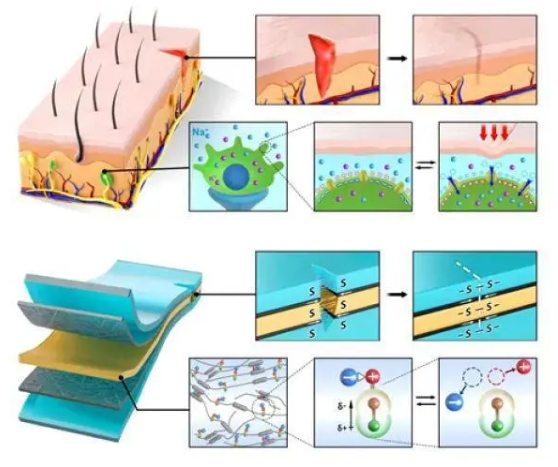
Scientists Develop Novel Iontronic Skin with Excellent Self-healing Efficiency and Sensitivity
Researchers led by Prof. ZHU Jin at the Ningbo Institute of Materials Technology and Engineering (NIMTE) of the Chinese Academy of Sciences have developed a novel mechano-responsive elastomer, i-DAPU, achieving high-performance iontronic skin that integrates self-healing and synchronous sensing.
The study was published in Advanced Functional Materials.

Biomimetic flexible sensors have attracted global attention in the field of intelligent tactile perception. Employing mechano-responsive elastomer as its dielectric material, iontronic skin stands out as a notable example of biomimetic flexible sensors that are emerging. The iontronic skin can replicate the soft touch and self-healing properties similar to human skin after injury, and imitate the pressure-sensing function of receptor cells.
However, Previous studies have predominantly concentrated on enhancing a single function, while paying scant attention to the concurrent improvement of self-healing efficiency and sensitivity in intronic skin.
Inspired by transmembrane proteins such as TSP-15, Piezo 1, and Piezo 2, which can recruit repair factors to facilitate cellular membrane self-repair, the researchers developed multifunctional molecular-ionic regulatory sites within a polyurethane/ionic liquid (PU/IL) composite system.
Donor-acceptor (D-A) self-assembly groups were integrated into the main chain of polyurethane, and then co-blended with the ionic liquid [BMIM]+[PF6]-, thus contributing to a novel mechano-responsive elastomer, i-DAPU.
Using i-DAPU as the dielectric material, the developed iontronic sensor, i.e., DA-skin, achieved excellent traction-assisted self-healing efficiency of 72 μm min-1 and superior dual-channel synchronous sensitivity of 7012.05 kPa-1.
In addition, the DA-skin was applied in clinical medicine for subtle change detection in muscle strength. Leveraging deep learning techniques for signal processing, a study successfully classified muscle strength levels with an accuracy rate of 99.2%, as demonstrated in research focusing on the application of deep learning in bio-signal recognition.
This study provides new design concepts and research strategies for the development of high-performance iontronic skin and shows great promise for healthcare applications.